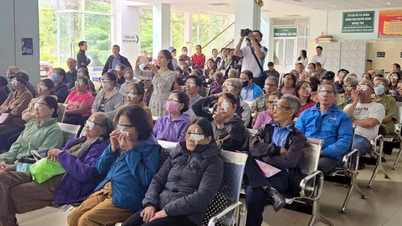Keeping a relaxed mood, sharing with your partner, trying new things, making schedules… can help couples sublimate their relationship.
Keep your mood comfortable
Uncontrolled depression and stress can dampen a person’s sexual desire and arousal. Research shows that stress reduces sexual desire in women more than in men. If methods such as meditation, yoga or exercise do not help you relieve stress, seeing a psychologist or therapist may be the solution.
Don't fake an orgasm.
Instead of faking orgasm, be open and share with your partner to solve the problem together. Being dishonest in sex can be detrimental to married life and can easily lead to a deadlock.
Each person should share their desires and preferences so that the other person can understand. If there is anything that is not satisfactory, give your opinion tactfully so as not to hurt the other person's feelings.
Don't skip the next part
The time couples spend together after the act is also very important. Instead of falling asleep or getting out of bed immediately, spend time talking, cuddling and sharing together. This is also an opportunity for both of you to get closer, connect more and create a higher level of intimacy, helping to bond.

Keeping a comfortable mood is the key for couples to get into a better rhythm of "love". Photo: Freepik
Schedule
Couples' sex lives change over time. In the early stages, the frequency of sex can be several times a day or a week. However, for many reasons such as stress, work schedules, having children... can cause the frequency of "love" to gradually decrease.
So, set up a schedule that you both agree on. This is also a solution in case one person has a higher sex drive than the other.
Try new things
Having sex in the same routine can sometimes be boring for both partners. Trying new things can bring excitement to couples but requires consent from the other partner. Changing the location, time of sex or giving surprises to the partner can help sublimate.
Solve health problems
The physical changes that come with aging can make sex a source of anxiety or fear. For women, menopause can cause vaginal atrophy and dryness, making intimacy more difficult. Changes in hormone levels, such as decreased testosterone production in men, can reduce sexual desire and cause erectile dysfunction.
Additionally, certain medications can decrease sexual desire or make it more difficult for a person to achieve orgasm.
Bao Bao (According to Healthline )
Source link


![[Photo] General Secretary To Lam receives US Ambassador to Vietnam Marc Knapper](https://vphoto.vietnam.vn/thumb/1200x675/vietnam/resource/IMAGE/2025/9/29/c8fd0761aa184da7814aee57d87c49b3)
![[Photo] The 1st Congress of Phu Tho Provincial Party Committee, term 2025-2030](https://vphoto.vietnam.vn/thumb/1200x675/vietnam/resource/IMAGE/2025/9/30/1507da06216649bba8a1ce6251816820)

![[Photo] Solemn opening of the 12th Military Party Congress for the 2025-2030 term](https://vphoto.vietnam.vn/thumb/1200x675/vietnam/resource/IMAGE/2025/9/30/2cd383b3130d41a1a4b5ace0d5eb989d)
![[Photo] General Secretary To Lam, Secretary of the Central Military Commission attends the 12th Party Congress of the Army](https://vphoto.vietnam.vn/thumb/1200x675/vietnam/resource/IMAGE/2025/9/30/9b63aaa37ddb472ead84e3870a8ae825)




























![[Photo] General Secretary To Lam attends the ceremony to celebrate the 80th anniversary of the post and telecommunications sector and the 66th anniversary of the science and technology sector.](https://vphoto.vietnam.vn/thumb/1200x675/vietnam/resource/IMAGE/2025/9/29/8e86b39b8fe44121a2b14a031f4cef46)
































































Comment (0)